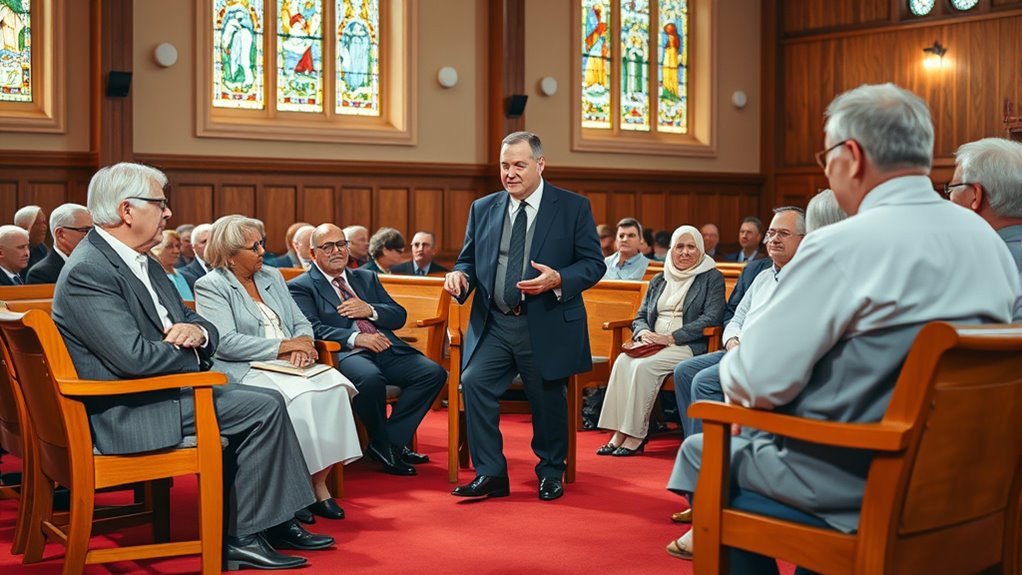Church leadership involves understanding the unique roles of pastors, elders, and deacons. As a pastor, you guide the congregation’s spiritual growth and outreach, while elders oversee spiritual guidance and biblical integrity. Deacons support practical needs like charity and church programs, fostering a caring environment. Together, they collaborate to lead effectively, rooted in biblical principles. If you want to explore how these roles work together and the qualities that make leadership effective, keep exploring further.
Key Takeaways
- Pastors lead spiritual growth, outreach, and church management, fostering community and guiding worship services.
- Elders oversee biblical adherence, provide spiritual guidance, and support the pastor with integrity and humility.
- Deacons handle practical needs, manage outreach programs, and support the congregation’s physical well-being.
- Effective church leadership relies on clear communication, collaboration, and biblical principles rooted in Scripture.
- Unity, transparency, and shared responsibilities strengthen church governance and promote community impact.
Defining the Role of the Pastor
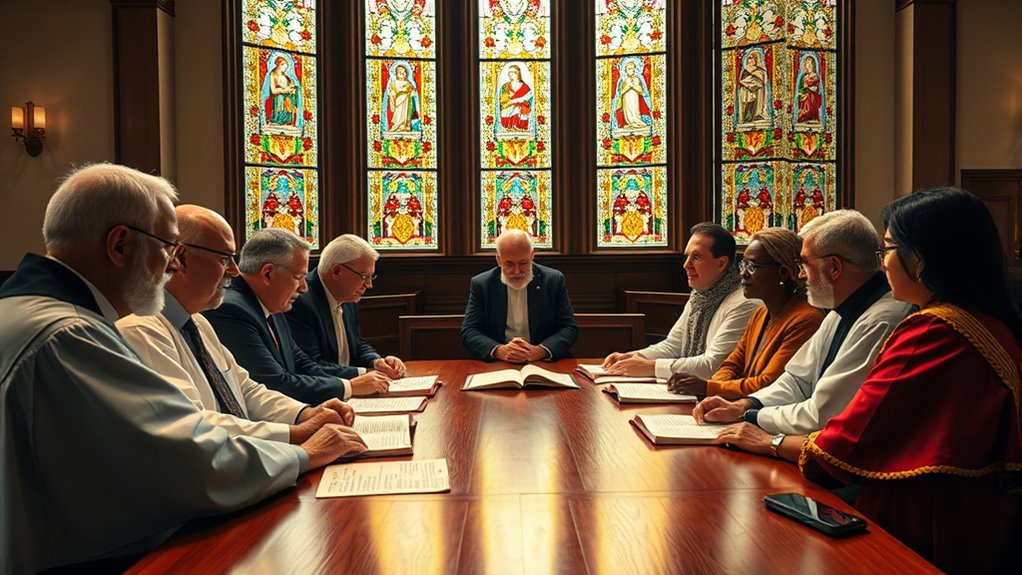
What exactly does it mean to serve as a pastor? It means guiding your congregation toward spiritual growth while actively promoting church growth and congregational outreach. As a pastor, you’re responsible for nurturing faith, providing spiritual support, and inspiring members to deepen their relationship with God. Your role involves creating a welcoming environment that encourages community involvement and outreach efforts. By focusing on church growth, you help expand your congregation’s reach, making the church an essential part of the local community. You lead services, offer counsel, and organize outreach programs that connect with those outside the church walls. Additionally, understanding how to maximize space and organization within the church can enhance the environment, making it more inviting and functional for all members. Implementing effective church management practices can further support sustainable growth and community engagement. Recognizing the importance of spiritual leadership helps pastors effectively guide their congregation through challenges and opportunities. Developing skills in congregational care ensures that members feel supported and valued, fostering a stronger community. Engaging in ongoing leadership development is vital to adapt to changing needs and to serve your congregation more effectively. Ultimately, your goal is to foster a vibrant, engaged congregation that reflects Christ’s love through active participation and outreach initiatives.
The Responsibilities of Church Elders
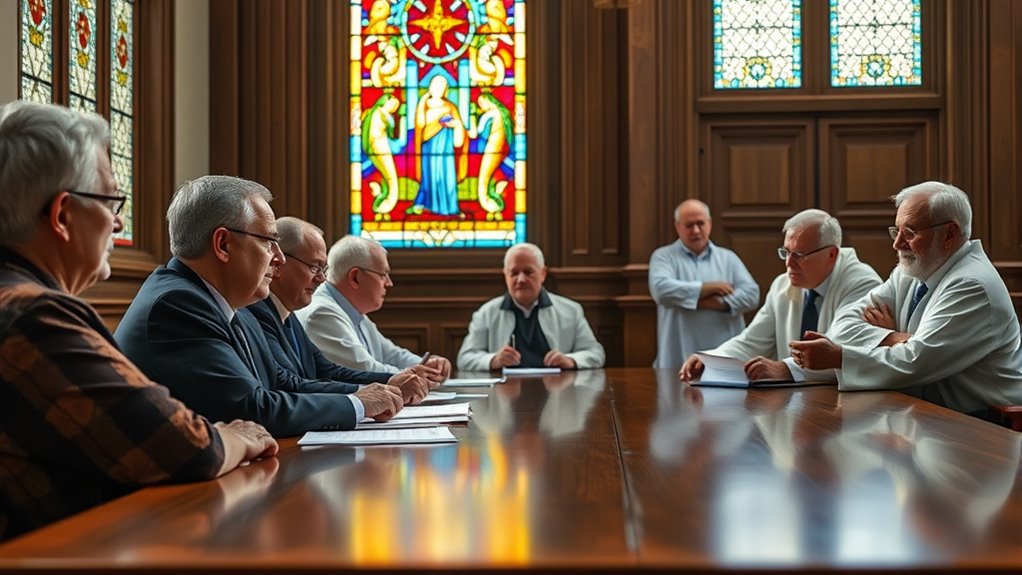
Church elders play a crucial role in guiding and maintaining the spiritual health of the congregation. Your church elder duties include providing oversight, offering spiritual guidance, and ensuring the church stays aligned with biblical teachings. As an elder, you’re responsible for prayer, counseling, and protecting the congregation from false teachings. Accountability is essential; you’re expected to lead by example and uphold integrity in all actions. Your role also involves making wise decisions, supporting the pastor, and fostering unity within the church body. Elders serve as shepherds, caring for members and encouraging spiritual growth. Incorporating church leadership qualities such as humility, wisdom, and compassion is vital for effective service. By staying faithful to your responsibilities and embracing elder accountability, you help create a healthy, biblically grounded church community where everyone can thrive spiritually. Recognizing the importance of AI safety measures in modern contexts can also help elders navigate new challenges with discernment and prudence. Additionally, fostering a culture of spiritual discernment can enable elders to better identify and address potential issues within the congregation. Understanding the divine authority guiding biblical leadership can further strengthen your capacity to serve faithfully. Engaging with Aboriginal health initiatives and promoting cultural awareness can also enrich the church’s outreach and inclusiveness, fostering respect and understanding across diverse communities.
The Function of Deacons in the Congregation
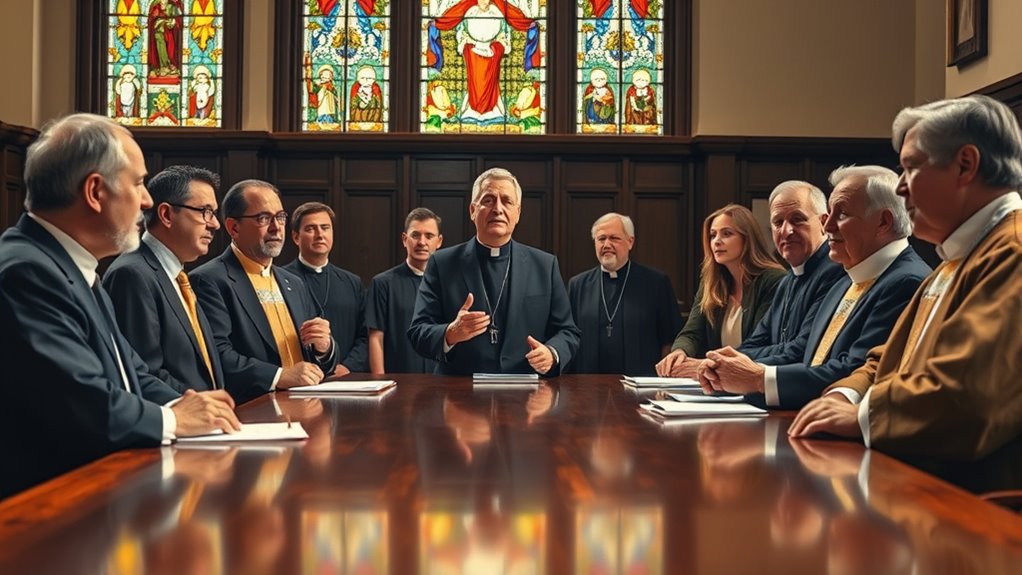
Deacons serve an essential role in supporting the practical and spiritual needs of the congregation, allowing the church to function smoothly and effectively. Their primary duties often include managing church charity, ensuring resources reach those in need, and organizing service projects. Deacons act as trusted helpers to the pastors and elders, taking on tasks that free up leadership to focus on spiritual guidance. Their work involves caring for the physical well-being of members, such as distributing aid or overseeing outreach efforts. Additionally, deacons often coordinate church programs and volunteer efforts to enhance community involvement. By fulfilling these responsibilities, deacons help foster a caring community rooted in service and compassion. Their dedication strengthens the church’s mission, making sure that both spiritual nurture and practical support are seamlessly integrated into the life of the congregation. Proper newborn care practices emphasize establishing routines and safety measures that promote overall well-being, which can be metaphorically related to the nurturing environment that deacons help create within the church community. Recognizing the importance of local building codes and permits ensures that all activities and facilities remain compliant and safe for the congregation. Furthermore, understanding signs of spoilage in perishable items can assist deacons in managing donations responsibly and safely. Incorporating biodiversity basics principles can also inspire sustainable practices within church outreach and community service efforts.
How Pastors, Elders, and Deacons Collaborate
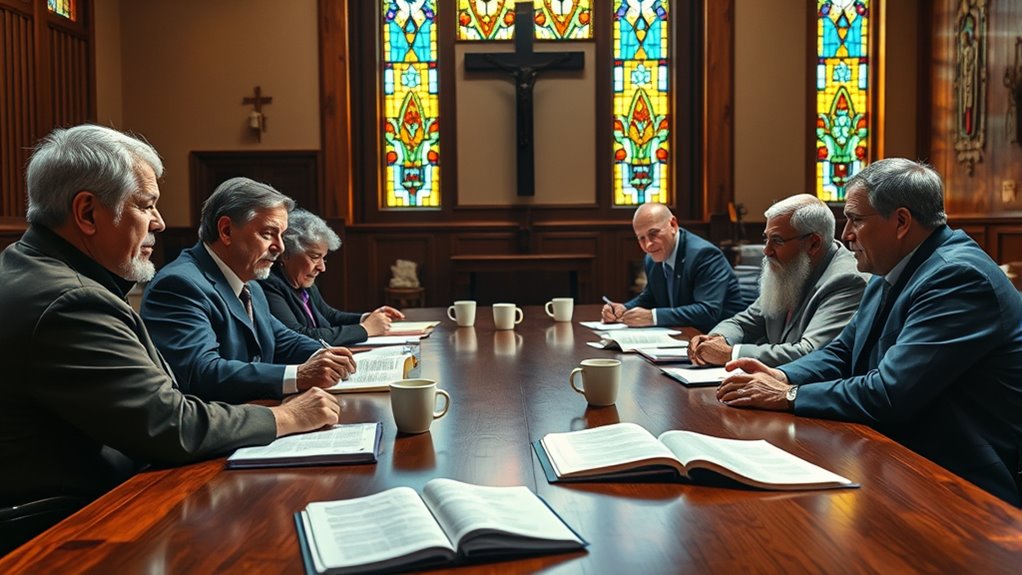
You play a key role in how pastors, elders, and deacons work together to lead the church effectively. When everyone shares spiritual responsibilities, communicates clearly, and supports one another, the church functions smoothly. This collaboration builds a strong, unified leadership team that guides the congregation with purpose. Recognizing the importance of visual clarity can also help ensure that visual presentations during services are clear and engaging, further enhancing the congregation’s experience. Additionally, understanding the roles and responsibilities of each leadership position can improve coordination and foster mutual respect within the team. Being aware of the affiliate disclosure and privacy policies can also promote transparency and trust among members and visitors alike. Incorporating knowledge of health benefits related to natural remedies can also support the well-being of church staff and volunteers during busy or stressful times.
Shared Spiritual Responsibilities
When pastors, elders, and deacons work together, they share the vital responsibility of guiding the spiritual health of the congregation. This collaboration strengthens church growth and enhances community outreach by aligning their efforts toward common goals. Pastors often focus on teaching and spiritual direction, while elders provide oversight and counsel. Deacons support practical needs and serve as liaisons within the community. By working as a team, they guarantee that spiritual needs are met, and outreach initiatives are effective. Additionally, understanding the roles of essential church leaders helps ensure that each member’s gifts and responsibilities are utilized effectively. Recognizing the importance of fellowship and cooperation among church leadership fosters a more unified and effective ministry. Their shared responsibilities create a unified approach to nurturing faith, encouraging involvement, and expanding the church’s impact. This teamwork fosters a vibrant, spiritually healthy congregation that actively reaches out to its community with compassion and purpose. Moreover, integrating security measures in payment processing can help protect the church’s financial resources and maintain trust within the congregation. Implementing trustworthy financial practices can further strengthen the church’s credibility and accountability. Incorporating fruit juice varieties into church events can also promote health and fellowship among members, reflecting a holistic approach to community well-being.
Clear Communication Channels
Effective collaboration among church leaders depends on establishing clear communication channels. When everyone knows how to share ideas, address concerns, and provide feedback, misunderstandings are minimized. This clarity supports conflict resolution, preventing small issues from escalating into bigger problems. Regular leadership training helps leaders develop the skills to communicate effectively, listen actively, and articulate expectations clearly. Open dialogue fosters trust and unity among pastors, elders, and deacons, ensuring everyone stays aligned on church goals. By setting up consistent meetings and using transparent communication methods, you create an environment where collaboration thrives. Clear channels not only improve decision-making but also strengthen relationships, making the church’s leadership team more effective and unified in serving the congregation. Incorporating tools like Pimple Patches can serve as a metaphor for addressing individual concerns quietly and effectively within the team.
Mutual Support Systems
How do pastors, elders, and deacons work together to support one another in their leadership roles? They create mutual support systems rooted in collaboration and shared goals. Pastors often lead community outreach efforts, but they rely on elders and deacons to execute these initiatives effectively. Elders provide spiritual guidance and oversight, ensuring that outreach aligns with the church’s mission. Deacons handle practical needs and coordinate logistics, freeing pastors to focus on leadership training and vision casting. Regular meetings foster open communication, enabling everyone to share insights and address challenges collectively. This teamwork strengthens the church’s impact and guarantees that each role complements the others, creating a unified leadership front committed to serving the congregation and community with purpose.
Biblical Foundations of Church Leadership
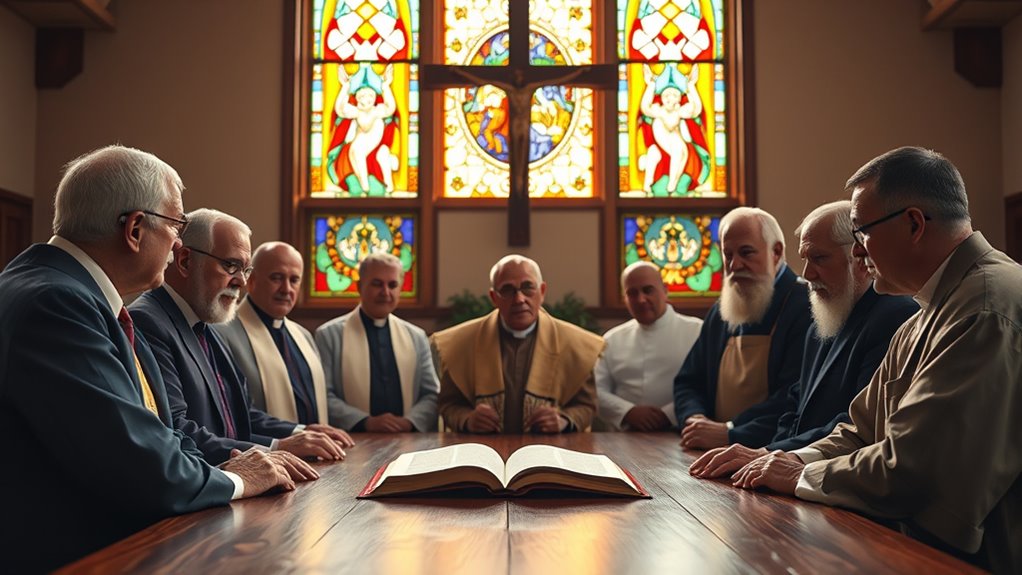
Understanding the biblical foundations of church leadership helps you make certain your approach with God’s design. You’ll explore the scriptural authority that guides leaders, the qualities they must embody, and models Jesus set for serving others. These principles ensure your leadership remains rooted in biblical truth and character.
Scriptural Authority for Leaders
Have you ever wondered where church leaders derive their authority? The answer lies in Scripture, which forms the foundation of church governance and spiritual authority. Leaders are called and empowered by God’s Word, not personal preference or tradition. Biblical passages like 1 Timothy 3 and Titus 1 outline qualifications and authority for elders and pastors, emphasizing divine appointment and spiritual oversight. Jesus’ instructions in Matthew 16:19 and Acts 20:28 highlight the importance of scriptural authority in guiding church leadership. When leaders operate within the framework of Scripture, they uphold God’s design for the church and ensure that authority rests on divine principles rather than human ideas. This scriptural authority gives leaders legitimacy and accountability in their roles.
Qualifications and Character Traits
Biblical qualifications and character traits are essential for effective and trustworthy church leadership because they reflect God’s standards for spiritual maturity. Leaders who embody these qualities foster healthy church governance and set a Christlike example. Key traits include being above reproach, gentle, and self-controlled. Proper leadership training helps develop these attributes and ensures leaders remain grounded in Scripture. To highlight this, consider the table below:
| Trait | Biblical Foundation |
|---|---|
| Integrity | Trustworthiness and honesty |
| Humility | Servant-hearted leadership |
| Self-control | Maintains discipline and focus |
| Compassion | Loves and cares for others |
| Faithfulness | Consistent in character and duties |
Biblical Leadership Models
Biblical leadership models provide clear guidance on how church leaders should serve and govern with integrity, humility, and faithfulness. These models emphasize servant leadership, where leaders prioritize others’ spiritual growth and community outreach. By following biblical principles, you foster an environment conducive to church growth and deeper community engagement. Key aspects include:
- Leading by example in humility and service
- Prioritizing spiritual maturity over personal gain
- Encouraging teamwork and shared decision-making
These principles help you build a strong, faithful church that attracts new members and positively impacts the community. Embracing biblical leadership models guarantees your church remains rooted in Christ’s teachings while effectively reaching out and growing. This approach strengthens your leadership and enhances your church’s role in community outreach.
Characteristics and Qualities of Effective Leaders
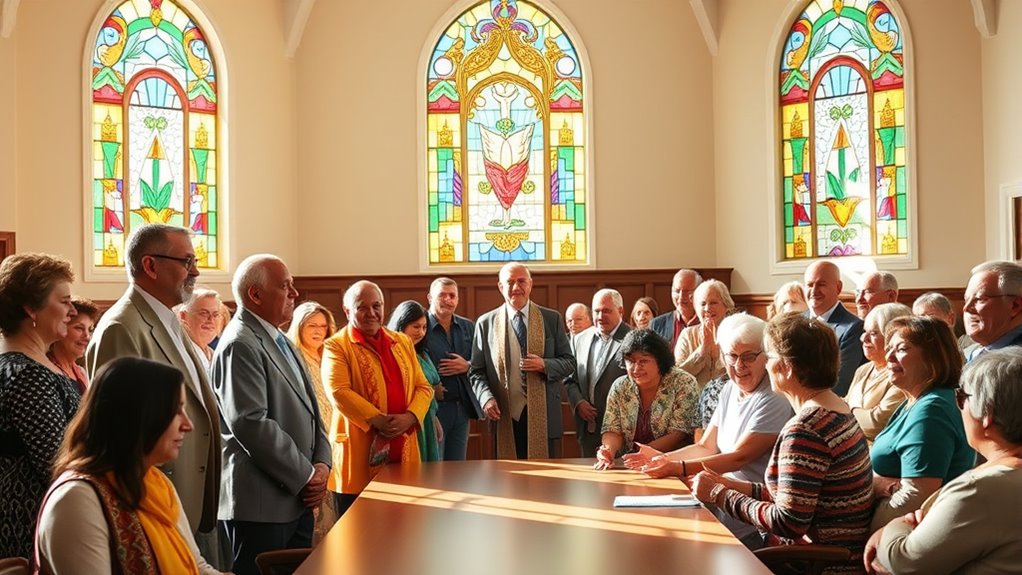
What makes a leader truly effective in a church setting? It starts with spiritual integrity—you must be genuine in your faith and committed to living by biblical principles. Effective leaders demonstrate servant leadership, prioritizing others’ needs over personal gain and guiding with humility. You should be approachable, compassionate, and willing to listen, fostering trust within your congregation. Integrity and humility create a foundation of credibility, inspiring others to follow your example. Good leaders also possess emotional maturity, resilience, and a strong sense of purpose rooted in God’s calling. By embodying these qualities, you’ll cultivate a healthy, thriving church community that reflects Christ’s love and truth. Ultimately, your character shapes your effectiveness and the spiritual growth of those you serve.
Frequently Asked Questions
How Do Church Leaders Handle Conflicts Within the Congregation?
When conflicts arise within your congregation, church leaders focus on conflict resolution to restore community harmony. You’re encouraged to listen actively, understand different perspectives, and address issues with compassion. Leaders facilitate open communication, mediate disputes, and seek common ground. By fostering a respectful environment and guiding members toward reconciliation, they help maintain unity and strengthen the church’s spiritual community. This proactive approach keeps the congregation united and focused on shared faith goals.
What Training or Education Is Recommended for Church Leaders?
To excel in leadership, you should pursue leadership development courses that enhance your skills and understanding. Additionally, theological education provides a solid foundation in biblical principles and doctrine. Combining practical leadership training with theological studies helps you lead effectively, make informed decisions, and serve your congregation faithfully. Continual learning through workshops, seminars, and mentorships is also valuable, ensuring you grow both spiritually and professionally as a church leader.
How Are Leadership Roles Assigned or Changed Over Time?
You should understand that leadership roles often involve leadership shift and role redefinition over time. As your church grows or faces new challenges, you might see leaders stepping into different roles or new leaders emerging. These changes typically happen through prayer, discernment, and consensus. Open communication helps guarantee everyone understands their evolving responsibilities, fostering a smooth transition and maintaining unity in the church’s leadership structure.
What Are the Financial Responsibilities of Church Leaders?
You might think church leaders only focus on spiritual matters, but they also handle financial responsibilities. You’re responsible for overseeing church fundraising efforts, ensuring donations are used wisely, and maintaining financial transparency. This means managing budgets, preventing misuse of funds, and being accountable to your congregation. By doing so, you build trust and support the church’s mission effectively, showing that financial stewardship is a crucial part of leadership.
How Do Church Leaders Balance Administrative Duties and Spiritual Care?
Balancing administrative duties and spiritual care is essential for effective clergy roles. You prioritize pastoral responsibilities by setting aside dedicated time for prayer, counseling, and teaching, ensuring spiritual growth remains central. At the same time, you handle administrative tasks efficiently, perhaps delegating some to trusted team members. This approach helps you stay grounded in your spiritual calling while managing church operations smoothly, ultimately serving your congregation better.
Conclusion
Understanding the roles of pastors, elders, and deacons helps you see how each part plays a crucial role in the church’s health. When everyone works together, the church runs smoothly and fulfills its mission. Remember, a well-led church is like a well-oiled machine—each part must do its part. By embracing these leadership roles, you contribute to a stronger, more unified congregation that truly reflects Christ’s love and purpose.

